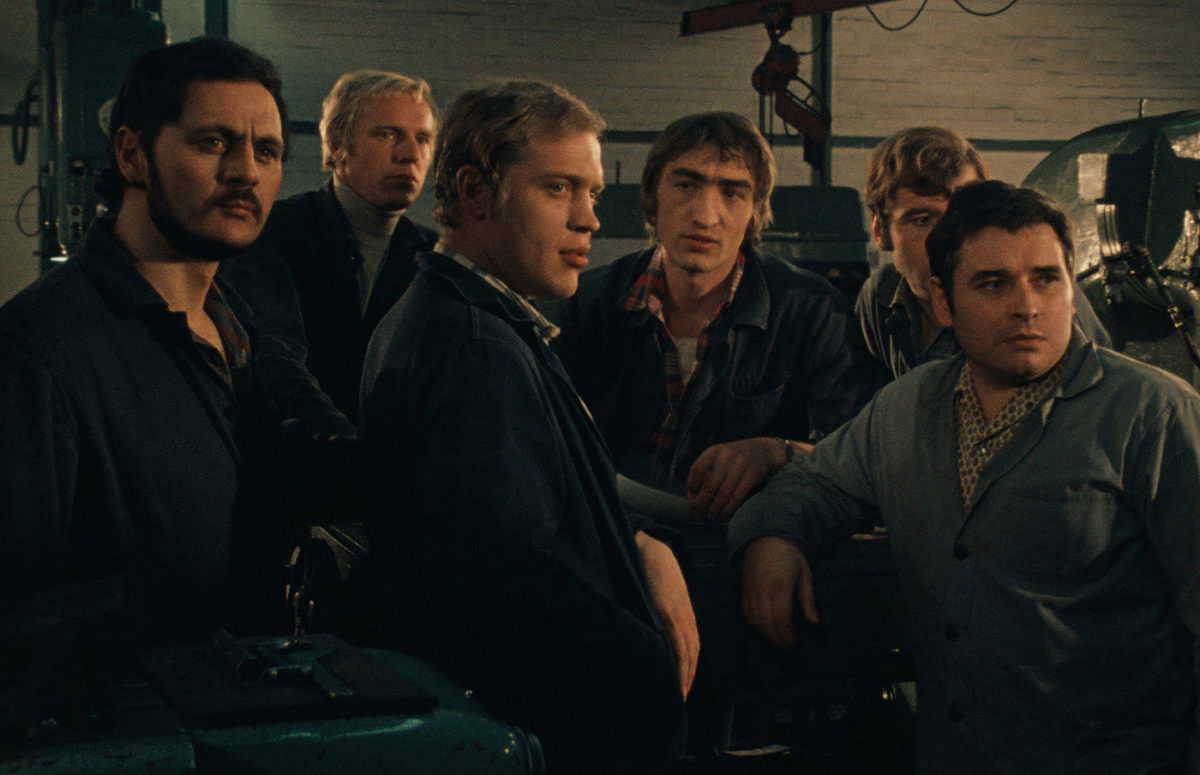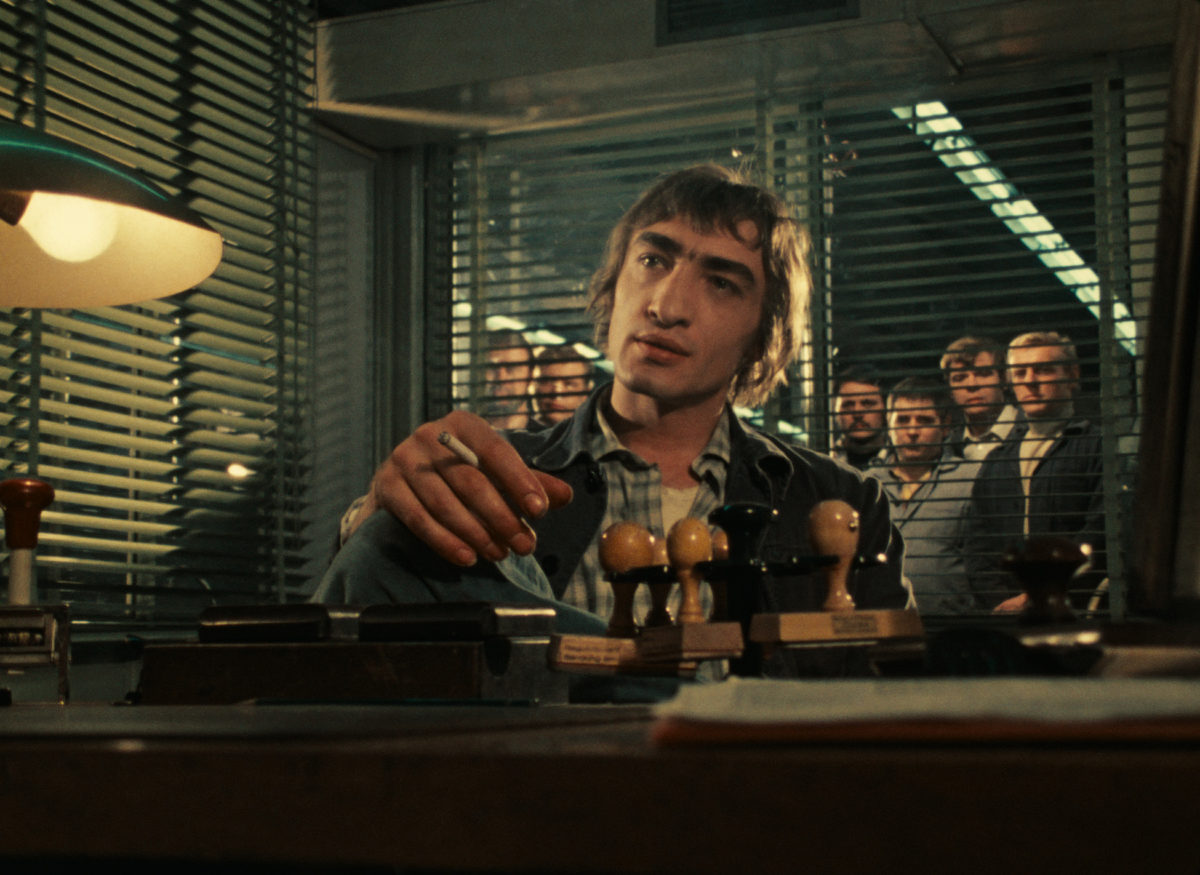An eight-hour film spread across five feature-length episodes, the self-referential title of Rainer Werner Fassbinder’s Acht Stunden sind kein Tag (Eight Hours Don’t Make a Day, 1972-1973) opens each chapter with a reminder that it is “a Family Series.” Not only a series about a specific family household, it is an examination of applying the term to larger contexts than its most familiar usage and what it means to be a part of one. Also at the forefront throughout is the human satisfaction that sprouts from a job well done, and the means by which every member of a family cultivates their own sense of fulfillment through different riffs on manual labor. Think Jean-Luc Godard and Jean-Pierre Gorin’s Tout va bien (1972) for the whole family, but where the Frenchies’ rhetoric waxes cosmically esoteric, Fassbinder keeps things simple (if longwinded).
The first episode begins with the sub-titular family gathered for a birthday party. There’s Jochen, the Neanderthal-profiled blue-collar worker who proves the ultimate testament that one should never judge a book by its cover; his grandmother and family matriarch known only as Oma (Granny), growing cleverer with age; Monika, Jochen’s wildly unhappy sister; Harald, her domineering husband; Jochen’s parents Kathe and Wolf; and his best friend and co-worker whose name I can’t recall.
When Jochen goes to a late-night vending machine to pick up more ‘bubbly,’ he meets Marion, struggling to retrieve a pickle jar she’s already paid for from the resilient machine (how comforting to know that in 1972 Köln, despite everything, pickles were available in late-night vending machines). The romance begins and they take center stage as the series’ main couple (after whom the first episode is also named). Many of their conversations – with one another or with co-workers and friends – lay the foundation for social arguments throughout; is marriage a natural (or proper) evolutionary step in the development of human relationships? Should workers be at the mercy of or on equal footing with their bosses?

The film sees Fassbinder lending re-validation to ideas which might be termed ‘socialist’ in the wake of the Third Reich. As Marion puts it in the first episode, “There must be a way to make money doing something you really like.” Jochen quickly retorts, “Sounds pretty leftist, where’d you hear it?” But Marion, arbiter of grace replies “I just think sometimes.”
After the supposed wise-lesson-conclusion of last year’s La La Land – that artists must choose between a committed relationship and advancing their art – RWF’s piece instead offers a more workable solution for both parties, not to mention all parties in the immediate vicinity. His vision is one of a societal triumph instead of a capitalist-driven lust for influence in all its varied forms; where people work together in the name of bettering conditions for all. When Jochen designs a machine to do his work for him he’s excited by the prospect of a bonus and fewer working hours – until he realizes his invention will affect the whole factory: his co-workers, who are truly friends (excluding a single hateful curmudgeon) will suffer for his flash of genius, at which point it becomes a struggle of ‘us v. them,’ workers against the factory. The floor manager is a particularly irritating specimen, trying to play God (and an unjust one at that) with his microcosm of control. Later we discover he is relatively powerless when faced with a decision by the real boss upstairs which favors the workers’ reasonable requests over the floor manager’s petty power trip.
Although not exactly avant-garde in its style, it looks unquestionably ahead to future problems faced by the blue-collar workforce, starting with the enormous job stealer of automation, and lashes out at true remnants of the Third Reich which linger in coded forms of discrimination which seem worse in our present-day society than ever before. Fassbinder’s muse Irm Hermann (who you might recognize from one of her 18 other roles with the director) as Irmgard Erlkönig, lets on with noticeable snark to Marion about her new boyfriend that people who get their hands dirty aren’t exactly untermenschen, “they’re just a different kind of person.” And all this political discussion of inequality with sense of humor perfectly intact: the boss’s boss is called Herr Groß (Mr. Big).
Each episode is named for a different couple – the basis around which families begin. In episode two, Granny and her newfound late-in-life-partner Gregor come across a dead library being systematically dismantled from the inside out while hunting for an apartment of their own and (after spotting children playing in the streets nearby) decide it will make for a perfect kindergarten. When they run into bureaucratic trouble, they take the kids downtown to hold a demonstration, where they begin to paint the walls inside city hall. Dissent and effective revolution for the whole family.
The characters in Acht Stunden sind kein Tag continually face the challenge of trying to be socially-minded. This is a minor mantra of Jochen’s throughout. Yet when, in the final episode, he’s faced with the challenging prospect of sharing an apartment with their respective co-workers, Jochen – now married to Marion – must re-face his own mantra to be ‘socially-minded’ and set aside his longing for total ownership of a private domain.
In some sense the entirety of the series is dedicated to asking its audience to do the same. Concepts of worker’s rights and unions are explained (and continuously updated) to Marion’s younger brother. And by way of the script’s beautiful way of simplifying everything without stooping to becoming patronizing, complex situations are reduced to elements so basic that even a child understands why they are perfectly wrong and unjust. Societal norms are so ingrained in us, we can’t imagine another way. “Things have always been this way,” we hear on more than one occasion. But things can change, suggests Acht Stunden, when discussed and approached openly, with the whole of society acting as the whole of a family, one household at a time, and one city at a time.

We are asked what it means to be ‘grown-up’ when even grown-ups behave like children. Harald beats his wife Monika and refuses to allow her any semblance of freedom. Even the prospect of her wanting to go back to work is seemingly beyond the limits of his worldly comprehension. One day she visits Oma at the kindergarten after such a dispute. Surprised to see tears fall from an adult face, one child in the kindergarten asks Gregor “Grown-ups cry too?” He replies solemnly, “Yes. It helps us let go.”
The film’s thesis is along the lines of Marion’s stern command to Jochen, “Don’t react to bullshit with more bullshit,” a command which causes him to buckle down and get things done correctly and through the right channels, which later culminates in a brilliant zoom-in on Jochen’s two-fingered peace sign held high, embodying the height to which the workers feel they’ve soared with their small victory. Yes, it all ends peacefully, but there will always be more to do.